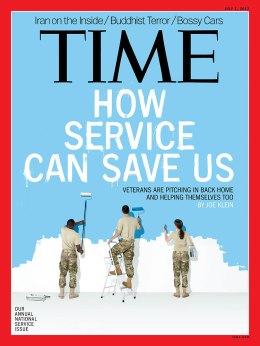
Well, there’s been a bit of a kerfuffle about my observation in this week’s cover story, that you don’t see organized groups of secular humanists giving out hot meals in disaster relief areas like Moore, Oklahoma, after the tornados. Let me explain.
First of all, I consider myself a secular humanist. It seems, somewhat to my surprise, that some people equate that term with atheism. You can certainly be a secular humanist and an atheist; but you can also be, as I am, a secular humanist for whom the jury is out on the question of the divine providence. To my mind, secular humanists are those who lack the scientific certitude of atheists, and also lack the spiritual certitude of the religious. It makes perfect sense to me: Can atheists be absolutely sure that there’s nothing after this? Can believers be sure that there is?
I’m Jewish. I respect the culture and the tradition of my foremothers (Judaism is carried in the matrilineal line); I think that the Old Testament version of God made sense before meteorology and geology were discovered, but not now. I love chanting the prayers in Hebrew, but for primal reasons, not because I’m under the impression that I’m giving God Her due. The prayers, especially the mourner’s Kaddish, are mesmerizing. They hold out the hope, and possibility, that we’re all connected in some mystic, ethereal way; that we’re part of a larger intention, which I hope is benign.
There is, I know, something mealy-mouthed and uncommitted about my squishy spirituality. And that is part of what I was thinking about when I made the observation about organized groups of secular humanists not being present in disaster zones. As a society, we’ve lost a good deal of our sense of communitarian commitment. That’s not a novel observation, of course. It was best made by Robert Putnam in Bowling Alone, twenty years ago. But the churches–disdained and sometimes ridiculed in my part of the world, Acela world–still have it. Many of their teachings are improbably literal and sometimes close-minded to the point of ugliness; but the church groups are always out there, in droves, when a disaster happens.
There was a time when secular service organizations had a greater sway in this country and, no doubt, a greater presence when disaster struck. But that’s not true now–although, it is certainly true, as my critics point out, that secular humanists, including atheists, can be incredibly generous. I never meant to imply they weren’t. But they are not organized. The effects of this post-modern atomization is something I’ve been trying to puzzle through for most of my career. That’s why I find the military, and the community values that are at the heart of military culture, so intriguing. That’s why I find the groups featured in my cover story about public service this week so inspiring. I believe that they sustain an essential part of citizenship that the rest of us have lost track of, the importance of being an active part of something larger than yourself.
I’m going to be spending the next nine months on book leave, trying to drill down into this area. That means my presence here in the Swamp and the magazine will be limited. I’ll miss you. Some of you. And I will be back, when the high sheriffs deem it necessary.


